Betaine HCl is a supplement that can help acidify your stomach and improve digestion, especially when the digestive enzyme pepsin is added.
In a normal, healthy stomach, your stomach acid is highly acidic, which enables you to rapidly and effectively break down the food you eat into digestible nutrients, vitamins, and minerals.
However, some people have low stomach acidity, which hurts their ability to efficiently digest the food they eat. This can cause indigestion and other gastrointestinal problems.
Taking a betaine HCl supplement can help the situation by adding more acidity to your stomach. When pepsin is added to the mix, digestion can improve even further. Our researchers have ranked the ten best betaine HCl supplements on the market according to their effectiveness.
Research
Rankings
1. NOW Betaine HCl
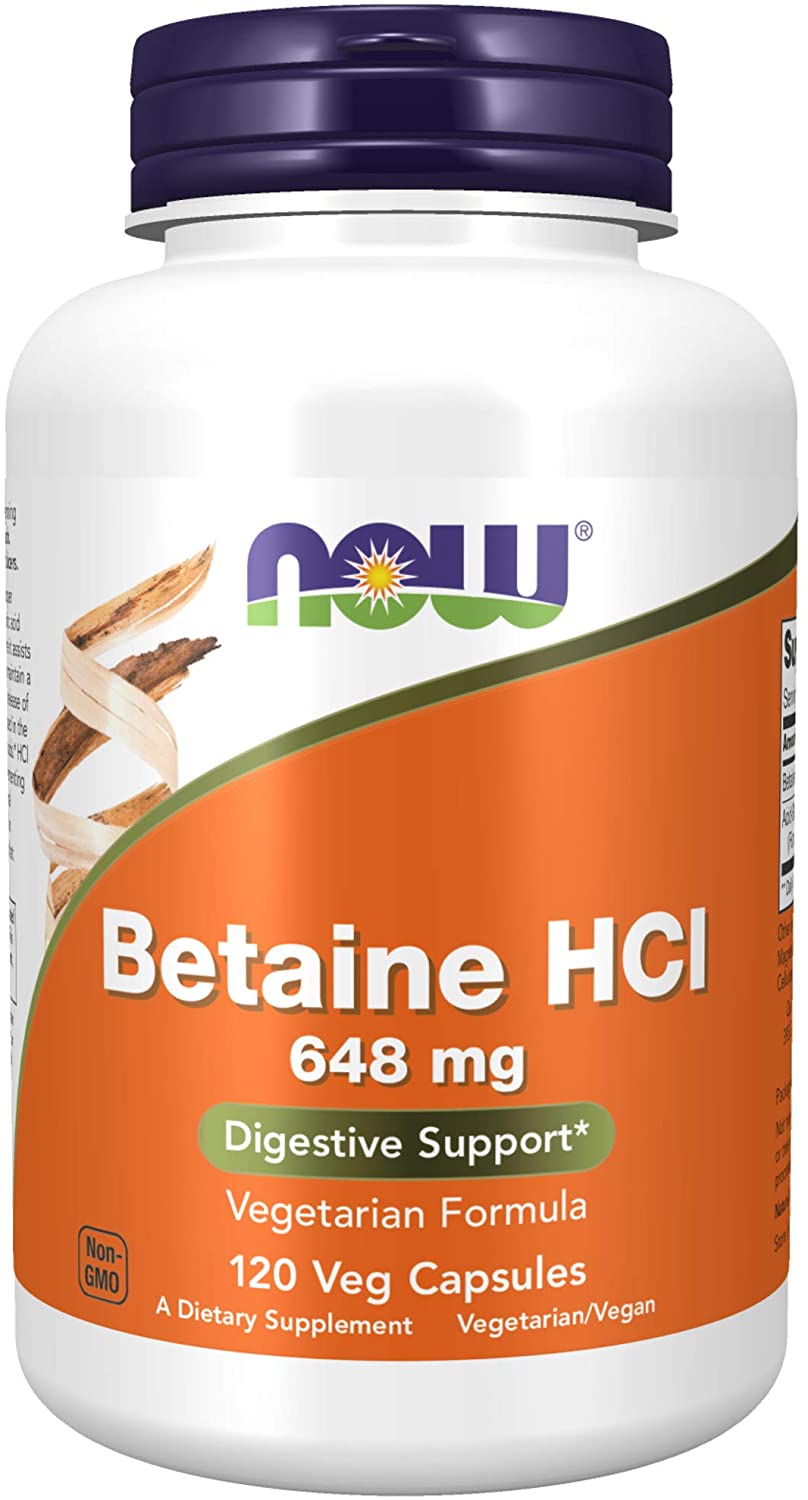
NOW Betaine HCl uses a pretty standard and strong dose of betaine HCl. Each capsule’s got 648 mg, but what makes this supplement unique is its use of a different digestive enzyme, protease.
This enzyme, like pepsin, also helps break down proteins, but it accomplishes it through a different mechanism.
The use of this enzyme instead of pepsin could make this supplement a strong choice if other betaine HCl and pepsin supplements aren’t working for you.
2. Solaray High Potency HCl + Pepsin
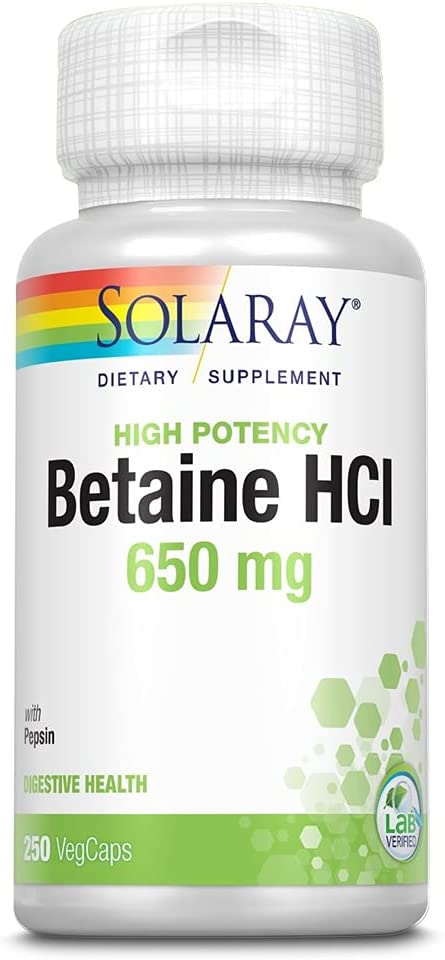
Solaray makes an HCl supplement delivered using a cellulose capsule that’s got a fairly strong dosage of 650 mg of betaine HCl per serving, along with 162 mg of the digestive enzyme pepsin.
It’s a fairly straightforward and simple formulation that’s widely used and very effective.
3. Dr. Clark Betaine HCl
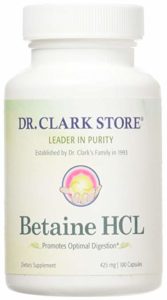
Dr. Clark Betaine HCl is the way to go if you want an extremely pure HCl supplement and you explicitly do not want any enzymes added to it. Each gelatin capsule contains 425 mg of pure betaine HCl and nothing else.
While this dosage is low, and there are plenty of reasons to add in pepsin or other digestive enzymes to a digestion supplement, this product is definitely the best pick for betaine HCl by itself.
4. Best Naturals Betaine HCl
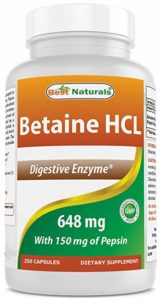
Best Naturals Betaine HCl has a pretty standard 648 mg of betaine, but what makes this supplement unique is the high pepsin content.
At 150 mg per capsule, this digestive enzyme is found in far higher concentrations in this supplement than in many competitors. If a regular betaine HCl supplement isn’t doing the trick, try upping the pepsin content with Best Naturals.
5. Premier Research Labs Premier HCl
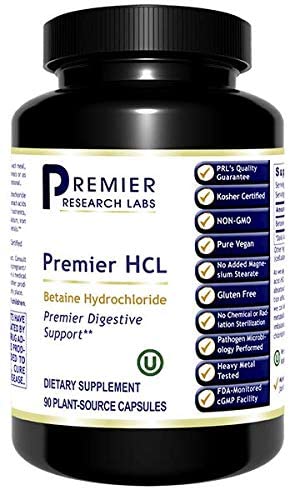
Premier Research Labs makes an HCl supplement that relies on a cellulose capsule for delivery, and given the absence of pepsin or other enzymes (which are invariably derived from animal sources), that makes this the only truly vegetarian and vegan-friendly HCl supplement worth a look.
Each capsule has a moderate dose of 500 mg of betaine HCl, so while it’s not the most potent supplement out there, it will get the job done for many people.
6. Doctor’s Best Betaine HCl Pepsin and Gentian Bitters
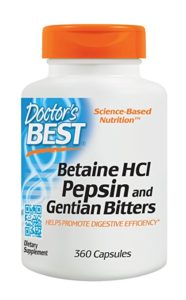
Doctor’s Best has a digestive supplement that goes the extra mile by including the extract of the gentian plant, which is native to Europe and has historically been used as an herbal remedy for digestive issues.
The scientific evidence supporting the use of betaine HCl and pepsin is stronger, though, so unless you feel like you need something extra, a more traditional digestive supplement might be a better place to start.
7. Pure Encapsulations Betaine HCl Pepsin
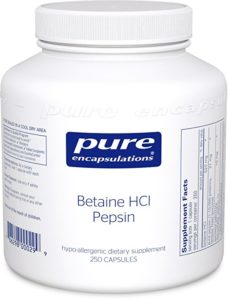
Pure Encapsulations has a fairly middle of the road lower-dose digestive supplement. With 520 mg of betaine HCl and 21 mg of pepsin per capsule, it’s a decent fit if you are looking for a lower dosage solution, but aside from that, most people would benefit from a higher dose supplement, at least to start with.
On the bright side, the supplement design is fairly clean, without much in the way of unnecessary additives.
8. Thorne Research Betaine HCl and Pepsin
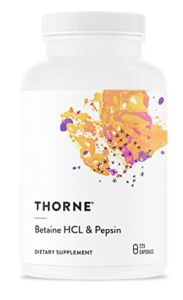
Thorne Research makes a more moderately-dosed betaine HCl supplement. Each capsule has 500 mg of betaine HCl, along with 24 mg of pepsin.
It’s got a few more additives than you might like to see, but the lower dosage could be useful if your stomach acid levels are only slightly low and you don’t want to overdo it with a stronger supplement.
9. Vital Nutrients Betaine HCl Pepsin Gentian Root Extract
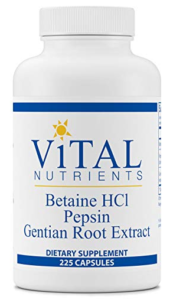
Vital Nutrients offers a betaine HCl supplement that, like a few other products, includes gentian root extract alongside pepsin in an attempt to boost its digestive power.
The main drawback with this supplement is that the pepsin content is lower than many similar supplements, because it’s provided in a 1:15,000 ratio instead of the more common and more highly concentrated 1:10,000 ratio.
This means that the effective dose per capsule is 50% less, so if you are relying on the digestive power of the pepsin enzyme, you might be disappointed.
10. Natural Factors Betaine HCl
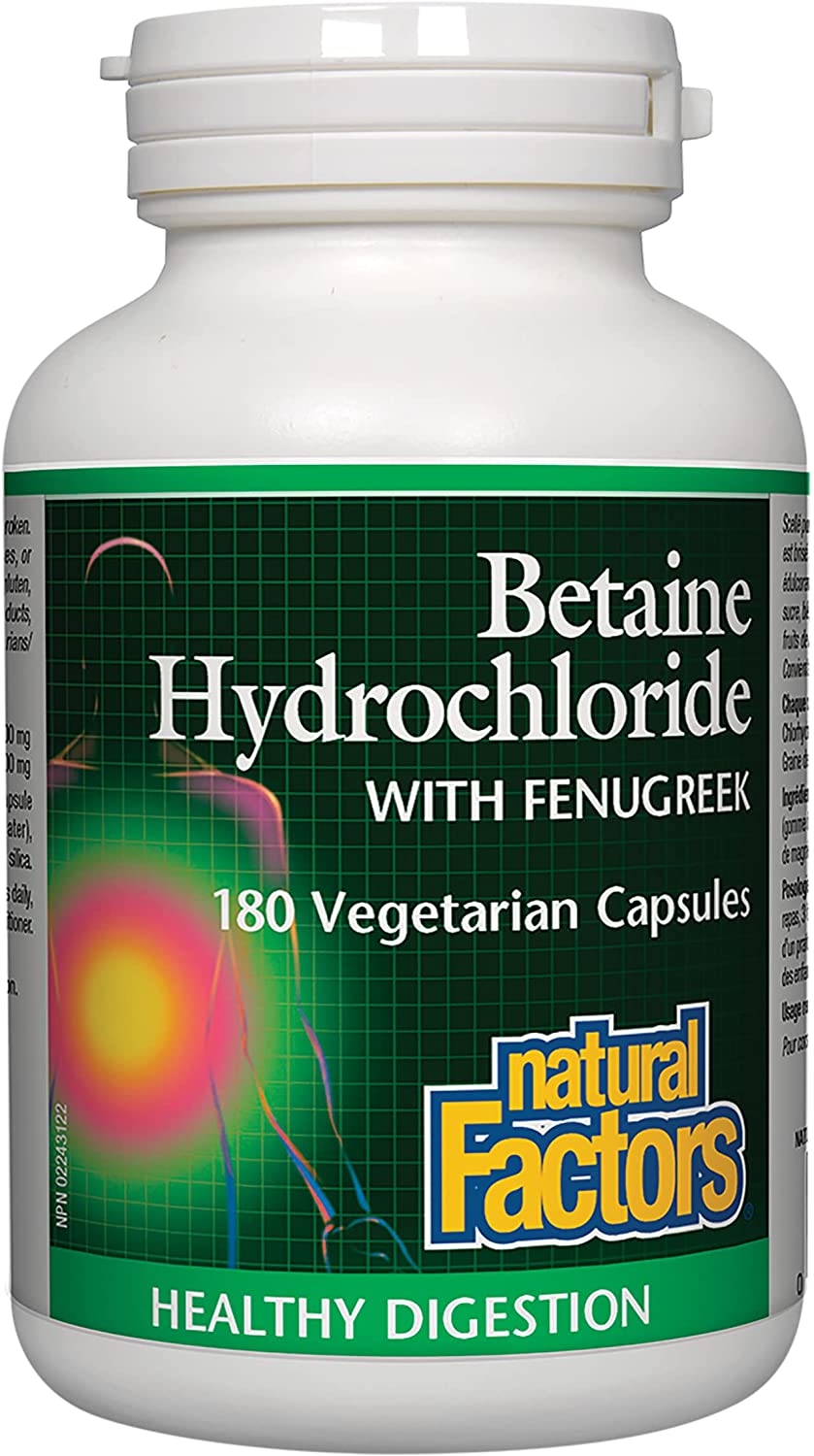
Natural Factors swaps out the usual pepsin for fenugreek seed extract, a less-common herbal extract that’s more often found in testosterone boosters and Ayurvedic supplement regimens.
While fenugreek does have a history of use for treating indigestion and gastrointestinal complains, it hasn’t been directly evaluated alongside betaine HCl the way pepsin has.
This, combined with the presence of a couple extra binders and fillers, makes this digestion supplement less desirable than some other competitors.
Category winners
Best betaine HCl overall: NOW Betaine HCl
NOW Betaine HCl is our favorite overall pick thanks to its high dose of betaine and its use of protease, a highly effective enzyme at breaking down proteins in your digestive tract. For this reason, it’s useful both for augmenting your stomach acidity and for fighting digestion problems through enzymatic means. This two-in-one combo makes it our top choice.
Best betaine HCl with pepsin: Solaray High Potency HCl + Pepsin
Betaine HCl and pepsin are commonly recommended as a combination supplement for acid reflux and other stomach issues, and if you’re specifically looking for the enzyme pepsin, Solaray is our recommendation thanks to its high dose of both betaine HCl and pepsin enzymes.
Best betaine HCl for stomach acidity: NOW Betaine HCl
NOW Betaine HCl uses its high dose of betaine HCl to boost stomach acidity, and on top of that, has an innovative approach to aid digestion with protease. If your goal is to address stomach pH levels that are too high (meaning not acidic enough), NOW is a good choice.
Best betaine HCl without enzymes: Dr. Clark Betaine HCl
For those who want a betaine supplement with no added enzymes, Dr. Clark Betaine HCl is the way to go. Whether you are taking your own digestive enzymes separately, or you’re only looking for betaine by itself, Dr. Clark provides a pure and simple supplement that fits the bill.
Best betaine HCl for fatigue: NOW Betaine HCl
Betaine HCl is becoming an increasingly popular supplement for people with chronic fatigue, due to the connection between gut function and the immune and hormone systems. For this application, our recommendation is NOW Betaine HCl, which does a great job of addressing stomach function with both betaine and protease.
Best betaine HCl for acid reflux: Solaray High Potency HCl + Pepsin
Betaine HCl and pepsin are a classic combination for acid reflux, and Solaray makes the best product on the market that includes both of these ingredients. This supplement is an easy choice when it comes to acid reflux.
Who should buy betaine HCl?
Betaine HCL is safe for most people and can help increase stomach acidity to help people who suffer from low stomach acid. Betaine HCL may also be effective for helping to prevent heart disease as it has been shown to lower levels of homocysteine.
Pregnant and breastfeeding women should speak to their doctor before taking betaine HCL as there is still a lack of research surrounding the safety in these populations. People with peptic ulcer disease should avoid betaine HCL as well since it may interfere with the healing of stomach ulcers.
How we ranked
We first looked at the ingredients of each betaine HCL supplement. We preferred products that used minimal fillers, additives, and binders to ensure nothing harmful was being ingested. Furthermore, we required all of our betaine HCL supplements to contain pepsin to improve to enhance digestion. Products like Doctor’s Best ranked well for also providing 20mg of gentian to further enhance digestive support.
Dosage was also important to consider, for both the pepsin content and the betaine HCL. According to research, upwards of 500mg of betaine HCL is the minimum requirement for causing positive stomach acid changes. As such, we preferred products like NOW and Solaray that had even more, as this showed their commitment to providing clinically effective dosages.
In terms of pepsin dosage, there are no clear concusses on what is optimal. However, based on our examination, around 20mg per serving (or more) of pepsin alongside betaine HCL seems to be safe and effective. This is why products like Thorne made our list.
Benefits
Betaine HCl causes a rapid increase in stomach acidity. The acidic compounds in solid betaine HCl are designed to rapidly dissolve in your stomach and provided much-needed acidity for people with low stomach acid levels.
So, how well and how quickly does it work? That question was addressed in a scientific study by researchers at the University of California San Francisco (1). Their study, published in the journal Molecular Pharmaceutics in 2003, used healthy volunteers who had artificially-induced low stomach acid.
The subjects swallowed a special sensing pill that directly measured their stomach acidity, then after a delay, took 1500 mg of betaine HCl. Within 15 minutes, the stomach acidity in all of the volunteers had rocketed from a pH of 5.2 down to a pH of 0.6 (lower values meaning a more acidic environment).
Betaine HCl’s effects last for about an hour and fifteen minutes. Because of the acidity monitoring pill that this study used, the researchers were able to continuously track the levels of stomach acidity as a function of time.
They found that the pH-lowering effects of betaine HCl lasted for about 75 minutes, after which stomach acidity climbed back to its normal levels.
The authors suggest that, because of these properties, betaine could be useful for boosting the absorption of medications, vitamins, or minerals that rely on stomach acid for absorption.
Normally, people with poor stomach acidity would have a hard time absorbing things like a zinc supplement, which often rely on stomach acidity to make the active ingredients bioavailable.
If you are taking pepsin, you should take betaine HCl too. Pepsin is the most significant digestive enzyme found in your stomach; it helps break down a huge range of the compounds that are in the food you eat.
If you take a pepsin supplement for indigestion or other gastrointestinal problems, you may not get the intended effects if you aren’t also taking it alongside betaine HCl.
As reported by researchers researchers in Marseille, France and published in the journal Gastric Disorders, the digestive powers of pepsin are greatest at low pH levels (2)—again, recalling that low pH equals high levels of acidity.
Pepsin works best at high levels of stomach acidity. If you want the optimal digestive power from a pepsin supplement, you need to make sure your stomach acidity is strong enough.
For normal and healthy people, there shouldn’t be any issues, but if you have indigestion or other issues that are making you inclined to take a supplement with pepsin, it’s possible that suboptimal stomach acidity could be contributing as well.
In this case, pepsin (as well as any other digestive enzyme found in a natural and healthy stomach, along with natural probiotic bacteria) will function much better in the presence of betaine HCl.
Betaine HCl may lower levels of homocysteine, a risk factor for heart disease. One interesting side effects of betaine HCl is that it appears to lower levels of a blood biomarker called homocysteine.
Research out of the Netherlands reports that betaine supplementation at high doses lowers homocysteine in both men and women when taken daily for six weeks (3). Since homocysteine is a risk factor for heart disease, this suggests that betaine HCl may be useful for heart health, too, though more research is needed.
Side effects
Because betaine HCl causes such a rapid and substantial increase in stomach acidity, you shouldn’t use it if you don’t have indigestion.
A normal and healthy stomach might get too acidic after a high dose of betaine HCl, though it’s possible that pepsin would ameliorate this somewhat. It’s also a poor choice if you have acid reflux disease, because the newly-acidic stomach acid can damage your esophagus even more severely.
The use of a betaine HCl supplement with pepsin is particularly discouraged because pepsin seems to be responsible for much of the damage associated with acid reflux disease.
According to research by James A. Koufman published in the medical journal The Laryngoscope in 1991, the primary cause of damage to the esophagus in chronic acid reflux disease is actually pepsin, and not the hydrochloric acid (HCl) present in both stomach acid and betaine HCl (4).
Further work by Nikki Johnston and other researchers at the Medical College of Wisconsin demonstrated why: the enzyme pepsin gets deposited on esophagus tissue during one acid reflux event, and remains there dormant—the enzyme is deactivated in conditions that aren’t highly acidic (5). But when new acid flushes up the esophagus again, it reactivates the pepsin which causes more damage.
Aside from people with acid reflux disease, pepsin may also cause allergic reactions, though reports of this are extremely rare.
One report published in 2016 described such a case; the features of this case were similar to other allergic reactions to enzymes derived from plant or animal products (6). Though extraordinarily rare, it is one additional side effect to be aware of.
Recommended dose
Direct clinical recommendations on betaine HCl dosing are few and far between, and for pepsin they are absent completely. It’s clear that 1500 mg of betaine HCl is sufficient to create a large increase in stomach acidity in very short order, but many people may not need such drastic swings in pH level in their stomach.
Instead, it’s probably better to start with a lower dose of betaine: 500 or 650 mg. If that’s sufficient, then you can maintain the same dosage, but if you are still having digestion issues, you could increase the dose or get a supplement with a higher dose of pepsin (keeping in mind the caveats above regarding pepsin and acid reflux).
FAQ
How does betaine HCL benefit the stomach? Betaine HCl is a supplement that can deliver acidity to your stomach in capsule form. It’s designed in a clever way to ensure that you can increase your stomach’s acidity, and thereby its digestive power, without being too harmful to the rest of your body.
It’s extremely effective when it comes to lowering your stomach acidity, and it may have ancillary benefits for heart health as well.
How do I know if betaine HCl is right for me? If you suffer from Hypochlorhydria, where the stomach produces a lower amount of acid, betaine HCl may be right for you. You will want to consult your doctor to diagnose the condition, and they can prescribe you an accurate dose based on your individual health.
There are no clear dosage standards, so it’s important to get a medical professional’s opinion before taking it. Typical doses range from 300 to 650 mg during or near the end of a meal that is protein-heavy.
Can I take betaine HCl while pregnant or breastfeeding? There is insufficient evidence to suggest that betaine HCl is safe for pregnant or breastfeeding women, so please consult your doctor before taking this supplement if you are expecting. When it comes to unknown supplements and pregnancy, it’s better to be safe and not take a supplement than take it and cause issues with your baby.
What happens if I am allergic to betaine HCl? If you are allergic to betaine HCl, you may experience common allergy symptoms like dizziness, nausea, itchiness, skin rash, headache, swelling in the throat or tongue, or a general feeling of being unwell. If you have a negative reaction after taking betaine HCl, please seek medical attention immediately.
How will I know if I’ve taken too much betaine HCl? There’s not a lot that is known about proper dosage for betaine HCl, so advice from your medical doctor to determine dosage is imperative. If you’ve taken too much betaine HCl and your meal has a low amount of protein, there can be an abundance of acid.
If you’ve taken the supplement before the meal, you can cause indigestion. Typically you can wait out these symptoms with no issue, but if you feel they are too severe, please get emergency medical attention as soon as possible.
Should I take betaine HCl if I am taking other medications? Due to betaine HCl increasing the acid in the stomach, antacids should not be taken at the same time, as they will debilitate. Similarly, Proton-pump Inhibitors (PPIs) and H2-blockers will be rendered less effective. Specific H2-blockers include ranitidine (Zantac), cimetidine (Tagamet), famotidine (Pepcid), and nizatidine (Axid). Specific PPIs include rabeprazole (Aciphex), omeprazole (Prilosec), pantoprazole (Protonix), esomeprazole (Nexium), and lansoprazole (Prevacid).
HCl should not be taken if you are using anti-inflammatory medications like aspirin, ibuprofen, NSAIDs, or Indocin. These medications can interact and cause gastrointestinal damage and increase the risk of bleeding or an ulcer. If you are taking any of these medications or any other prescribed medication, please consult your doctor before taking betaine HCl.
Should I take betaine HCl if I am taking other supplements? There are no notable interactions between betaine HCl and other herbal or natural supplements. Please consult your doctor before combining betaine HCl and any other supplements in case you do have an adverse reaction.
Can betaine HCl cause ulcers? There is concern that betaine HCl could potentially irritate stomach ulcers or prevent them from healing because of the amount of acid the supplement helps produce. While there’s not enough evidence to suggest that they cause ulcers, it seems that they can impact existing ones. If you have a stomach ulcer, please consult your doctor before taking this supplement.
What are the best brands of betaine HCl on the market? Choosing the right brand for you will involve some research, and perhaps a recommendation from your doctor or pharmacist. If a brand has been on the market for a while, and they have a great reputation, you can likely trust their product will be high-quality.
Some of the most popular betaine HCl supplements include betaine HCl 648 mg w/ Protease 120 Vegetable Capsules, Renew Life DigestMORE HCl – HealthBodyNutrition, Solaray High Potency HCI With Pepsin, Jamieson Natural Source Nutrisentials Digestive Enzymes Caplets, and Prairie Naturals Betaine HCL 500mg Plus Peppermint.
When should I take betaine HCl? If you take betaine HCl to combat heartburn, you should always take your supplement half-way or towards the end of the meal. If you take it earlier than these two options, you could amplify the heartburn and reduce the production of stomach acid, impacting your body’s ability to digest the meal.
Does betaine HCl combat candida? Betaine HCl can inhibit the overgrowth of chronic candida. It helps prevent candida from establishing itself in the small intestine and wreaking havoc in the body. There would need to be more research and clinical trials to prove if betaine HCl would be effective in treating candida. Please consult your doctor if you suffer from candida and want to take a betaine HCl supplement to help combat it.
Can betaine HCl help with food allergies? The acid secreted by the stomach when a meal with protein is consumed could potentially break food allergens down, so they’re small enough to be undetectable in the body, preventing any negative reaction.
There are theories that suggest that food allergies are amplified by proteins that are not fully digested, so naturally, betaine HCl could be connected to helping break those allergens down to a small amount. Early research suggests this could be the case. However, there is not enough research to provide concrete evidence either way. Clinical trials that focus on betaine HCl as a food allergen treatment would be required.
Is betaine HCl suitable for children? There is insufficient evidence to suggest betaine HCl is appropriate for children, so do not administer it to them without the advice of their doctor. They can run tests to diagnose your child if needed.
What happens if betaine HCl does not work? Typically, there are specific reasons why betaine HCl doesn’t work. The first reason is that you may be taking it when you’re not supposed to. If you are on other medications, they may interact with the supplement, causing it not to work, or causing other damage to the body. The second reason is that you might be taking betaine HCl with the wrong foods.
If you are not digesting protein and you’ve taken the supplement, you will likely have painful heartburn as a result. The third reason is that you are not taking an appropriate dose. You must consult your doctor to determine the proper dose for you. There is an average guideline, but most people end up being above or below that threshold.
Can betaine HCl cause weight loss or weight gain? Research suggests that individuals who struggle with inadequate stomach acid may have an impact on how difficult it is to lose weight. Correcting that problem may result in easier weight loss, but the evidence is lacking to confirm this. If you are looking for a solution to help your weight loss and want to try betaine HCl, please contact your doctor to get diagnosed to ensure you require it before taking it.
Can betaine HCl cause headaches? There’s no clear evidence to suggest that betaine HCl might cause headaches or migraines, but each individual is different. Some users of the supplement have claimed that their migraines lessened after being introduced to betaine HCl. In some research, overall health is heavily reliant on gut health, so it’s a possibility. If you find there is an increase in headaches after taking betaine HCl, please consult your doctor.
Does betaine HCl reduce joint pain? In this 2016 study, one man who started taking betaine HCl for acid reflux and inflammation, and reported his chronic knee pain as a result of three surgeries was improved after taking the supplement (7). While this is one study that is quite limited, further studies and clinical trials with larger groups would be needed to conclude that betaine HCl improves joint pain.
How long does it take for betaine HCl to take effect? Betaine HCl is relatively fast-acting. You should be taking your supplement in the middle of your meal or near the end in order for it to take effect when the body starts to digest your meal. It will start working within 30 minutes of taking the supplement.
Should I find a betaine HCl supplement with pepsin? There are many supplements on the market that do and do not include Pepsin. Typically, if the body does not produce enough stomach acid, it’s likely that the stomach will not produce enough Pepsin as well. Pepsin is required to break proteins down into peptides to be properly absorbed and utilized by the body.
Taking a stand-alone betaine HCl could possibly be helpful for treatment, but that should be determined by your doctor. Your physician can determine if you require a supplement that includes Pepsin, and can suggest an appropriate one. If you choose a supplement without Pepsin and you require it, you could be missing out on important benefits, nutrients, and you may not be getting the full relief you require.
Related articles
Recap
Betaine HCl is a simple and easy way to rapidly increase the acidity levels in your stomach. When taken via a capsule, betaine HCl starts working within 15 minutes, and its effects last for about an hour and 15 minutes.
After that, your stomach acid levels will return to normal. If you are taking it for digesting a meal, this means you have about a 90 minute window after taking the supplement where your digestion will be working most effectively.
Pepsin may help with digestion if it’s added to a betaine HCl supplement, though the evidence supporting it is less strong than that of betaine HCl alone. However, if you do take pepsin, you definitely want to take it in the presence of betaine HCl, as pepsin won’t work optimally if your stomach acid is not strong enough.
In terms of side effects, people with acid reflux disease should be hesitant before taking a betaine HCl supplement with pepsin, because pepsin appears to be the real culprit for much of the damage caused to the esophagus in acid reflux disease.
For dosing, starting at a level of 500 to 650 mg seems to be a good starting point, though some studies on the acute effects of betaine HCl on stomach acidity have used doses of up to 1500 mg at once. If low stomach acidity is causing digestive problems, betaine HCl, possibly combined with pepsin, could be the fix your are looking for.
For BodyNutrition’s #1 recommended Betaine HCl, click here.